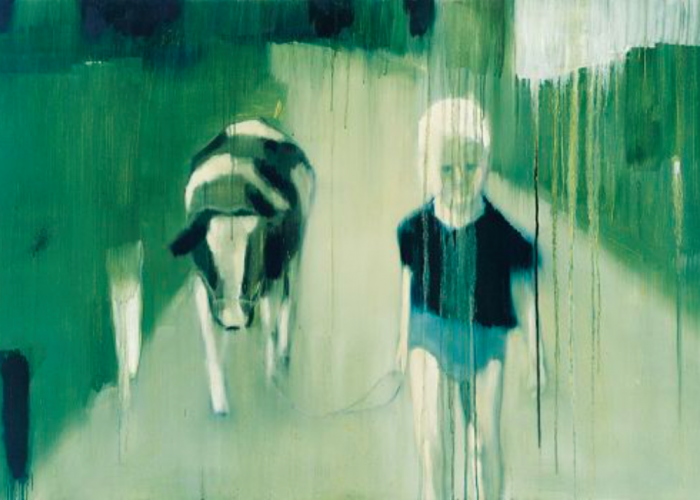Hegira
Adam Morris
Slakers shambled along the coasts, the brine in the breeze searing nostrils, lashing cheekbones and the edges of eyelids, whittling parts of faces to skin-wrapped bone. Aside from slits for vision their bodies went draped in canvas and denim, thick twill: fabrics too sturdy for perspiration to mix with the sting in the air. They pushed carts of rags and tarps and funnels and metal drums of dun-colored water, sloshing lukewarm but still able to quench and sometimes, also, to cleanse. Their ministry was as secular as the suffering it attended: pouring slim, dusky streams into withered gullets gone feathery and tight in the dusty, gagging air.
They were journeymen, they were shamans, they were witches: that’s what was said. New Bedouins of the Atlantic Coast. The Slakers were driven from dry places like a curse. In the remaining inhabitable wetlands they knew they were unwelcome, regarded with scorn and watched closely as known thieves. It was seldom trusted that all they desired was to hover under low pressures, to collect the dew, the drizzle, the infrequent rain. But they carried no divining rods. They were not snake-dancers or tremblers. Some had been evangelicals, some still were: it’s true. Others had been and now weren’t, they and their God having mutually forsaken salvation. Still others were idealists: student-age in less-dire times. In the twentieth, twenty-first, some would have been armlocked freedom-marching rebels or dewy-eyed dreadlocked lovers calling for an end to dams or nukes or war. But Slakers of both sexes kept their napes close-cropped, aside from the occasional penitent tonsure; hair would only get matted in dirt and oil, though stubble, for lack of moisture, abounded. Razors had long fallen from favor. Some Slakers had studied the hippies and some knew of the Shakers, whence the name: it was said the first Slakers followed a young preacher who styled herself Mother Help. Shunning procreation, converts and recruits became adept at abstention and homosexuality.
Under sunsets scored in pink and gold and even green they spread their tarps along the roads outside the barricades that mark the makeshift cities surrounding the desalination plants, heaps of hovels that swarm with Settlers, the name the Slakers use for those still fettered to the devices and solutions of the so-called civilized, the stationary. And in the morning, before the scorching sun can crest the shining line of the horizon, turning to slice the sea, a slow stream of three or four Settlers will abandon the plant, shuffling and gasping past the barriers to where the Slakers gather up their tarps.
**
Image by Ser Jiménez. Curated by Marisa Espínola for Espacio en Blanco. (More)
[ + bar ]
The Riverbed
Carol Bensimon translated by Adam Morris
They so happened to be born in a rather small town between two more or less larger ones, something they couldn’t get used... Read More »
Kondenswasser
Anja Kampmann
Versuch über das Meer
Es soll um den Horizont gehen den
Farbauftrag der Ferne das helle Knistern
der Flächen von Licht und die Verbreitung
des Lichts wie es... Read More »
After Kenneth Goldsmith: an interview
Michael Romano and Kenneth Goldsmith
I.
I have a bunch of questions but they’re still pretty disorganized in my mind.
So let’s just shoot.... Read More »
Hyperion [moscow]
By Marfa Nekrasova translated by Nathan Jeffers
The word Hyperion has many possible meanings; it can refer to a book, a poem, a tree,... Read More »




![Hyperion [moscow]](http://www.buenosairesreview.org/wp-content/uploads/DSC06622-700x500.jpg)



 sending...
sending...